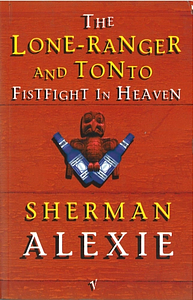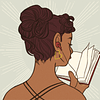Take a photo of a barcode or cover
It took me a while to work through this collection. I think Alexie's style is somewhat dry, though not unenjoyable; it's unique, especially because I've found that most writers that weave in and out of magical realism like he does are more flowery with their writing. It's hard to describe because Alexie isn't clunky or bland, but it's more like the prose spits in the face of anything approaching ornate or pretentious. These stories are going to be about trailer parks and alcohol and blue jeans and diet soda, damn it -- they will not be using SAT words of the day. I appreciate that.
I'm glad my edition is the 20th anniversary edition because there's an interesting prologue from Alexie that I think sheds some light on the tone of the stories. He admits that looking back at the collection, he thinks an angry person wrote them. And I do think the stories are very angry, very bitter. Everyone is struggling and desolate in each of the stories, but each in an empty, passionless, passive sort of way. I'd hazard to guess that's a commentary on how Alexie viewed the American Indian at the time of his writing these stories, which makes me curious about his later work.
I'd say the collection is tonally one-note, but it's not tiresome in a way that you might expect. It's more like a carousel of characters in one community, dipping in and out of different people's lives and loosely centering around one main character whom I assume is Alexie's avatar. Even though this collection is highly personal, it also feels like everything is held at arm's length, numbed to the emotion of what it's describing. Stories about people dying of alcoholism or being malnourished or having their dreams crushed are all told almost with a smirk, maybe because if they weren't it would verge on the edge of melodrama.
I'm glad my edition is the 20th anniversary edition because there's an interesting prologue from Alexie that I think sheds some light on the tone of the stories. He admits that looking back at the collection, he thinks an angry person wrote them. And I do think the stories are very angry, very bitter. Everyone is struggling and desolate in each of the stories, but each in an empty, passionless, passive sort of way. I'd hazard to guess that's a commentary on how Alexie viewed the American Indian at the time of his writing these stories, which makes me curious about his later work.
I'd say the collection is tonally one-note, but it's not tiresome in a way that you might expect. It's more like a carousel of characters in one community, dipping in and out of different people's lives and loosely centering around one main character whom I assume is Alexie's avatar. Even though this collection is highly personal, it also feels like everything is held at arm's length, numbed to the emotion of what it's describing. Stories about people dying of alcoholism or being malnourished or having their dreams crushed are all told almost with a smirk, maybe because if they weren't it would verge on the edge of melodrama.
Alexie writes in his introduction to this 10th anniversary edition that, "When the book was first published, I was (and continue to be) vilified in certain circles for my alcohol-soaked stories. Rereading them, I suppose my critics have a point. Everybody in this book is drunk or in love with a drunk. And in writing about drunk Indians, I am dealing with stereotypical material. But I can only respond with the truth... When I write about the destructive effects of alcohol on Indians, I am not writing out of a literary stance or a colonized mind's need to reinforce stereotypes. I am writing autobiography." Alexie now lives off the reservation in Seattle, which would make him what he calls an Urban Indian, and is presumably not drunk.
Alexie is definitely a writer's writer. As a reader, I liked about half the stories in this collection.
Wonderful book about the struggles of native americans. Excellent!
Very beautiful written. Mr. Alexie has a way with words. Quite depressing as well.
I've read a bunch of Sherman Alexie and always found him to be a brilliant author. This is the first I've read his older work - maybe his first book? Much darker than his later books that are peppered with more humor and wit. His depiction of life on the reservation is heart-wrenching and painfully real.
I seriously love Sherman Alexie and loved the forward he wrote for my edition. Favourite stories: The Trial of Thomas Builds-the-Fire; Jesus Christ's Half-Brother is Alive and Well on the Spokane Indian Reservation; A Train is an Order of Occurrence Designed to Lead to Some Result; The Approximate Size of My Favorite Tumor; Witnesses, Secret and Not
This book was heartbreaking and poetic. I'm really glad that my partner reintroduced me to Sherman Alexie.
Review from Sept. 2005:
A book of short stories about native Americans, most of them having something to do with the other characters.
I liked this book quite a lot. A friend of mine said that it was a bad book to read because it only re-enforced bad stereotypes of native Americans-that they drink and fight and are lazy and tell "stories" instead of "truths". Another friend of mine didn't like it because it never showed any signs of improving and no closure.
To me, it didn't need any closure. Every story itself had one. It didn't make me think native americans were lazy or whatever my first friend thought. I just thought it was beautifully written for realistic relationships between people and dreams and situations, etc. I thought the styles were great, I thought the imagery was great. For me, the author accomplished something, and I think it was what he wanted.
A book of short stories about native Americans, most of them having something to do with the other characters.
I liked this book quite a lot. A friend of mine said that it was a bad book to read because it only re-enforced bad stereotypes of native Americans-that they drink and fight and are lazy and tell "stories" instead of "truths". Another friend of mine didn't like it because it never showed any signs of improving and no closure.
To me, it didn't need any closure. Every story itself had one. It didn't make me think native americans were lazy or whatever my first friend thought. I just thought it was beautifully written for realistic relationships between people and dreams and situations, etc. I thought the styles were great, I thought the imagery was great. For me, the author accomplished something, and I think it was what he wanted.
I am giving this 5 stars even though I don't think its perfect because I loved the bits I loved more than I didn't like the bits I didn't like. It's wayyyyyy better than the Absolutely True Diary of a Part-Time Indian.




